U.S. Deputy State Secretary Stephen Biegun called for Belarusian authorities to give its people the right to “choose their leaders through a truly free and fair election under independent observation” in his remarks at a special meeting on the situation in Belarus held by the Organization for Security and Cooperation in Europe (OSCE) in Vienna.
“What is clear to the world is that the Aug. 9 election in Belarus was fraudulent,” Biegun said on Aug. 28 during the OSCE meeting of 57 member states where he represented the United States.





